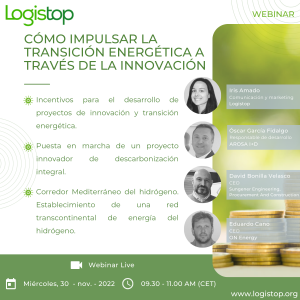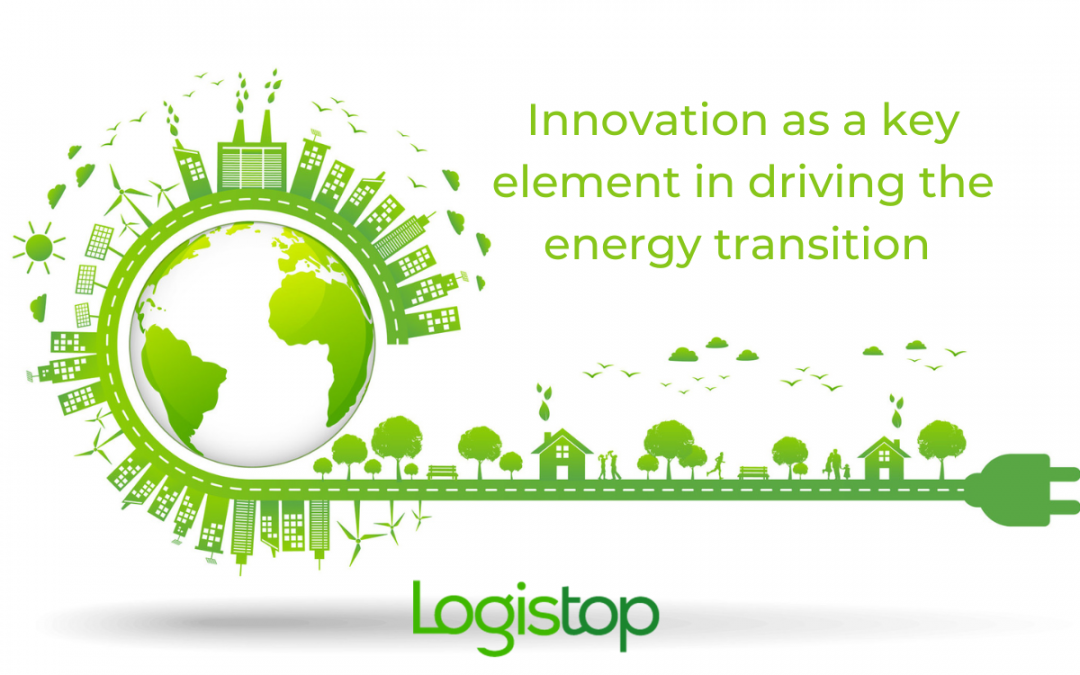- A decarbonisation project not only takes into account the provision of renewable energies, it is also affected by the efficiency of its processes and facilities, and thus the development or incorporation of new technologies.
- Decarbonisation must result in a cost-effective and efficient economic reduction, in addition to the social responsibility commitment of each organisation.
- One of the current challenges is the development of green technologies that enable the cost equalisation of a fossil economy into a hydrogen-based one.
In the Logistop Webinar “How to boost the energy transition through innovation”, the range of incentives and lines of public funding for the development of innovative projects related to the energy transition of the company were presented, complemented by two case studies that have highlighted the importance of participating in the development of innovative projects in this field. We have counted with the participation of Óscar García Fidalgo, Head of Development, AROSA I+D, David Bonilla Velasco, CEO, SUNGENER EPC, y Eduardo Cano, CEO, ON Energy, as well as with the presentation and moderation of Iris Amado, Communication and Marketing, Logistop.

Incentives for the development of innovation and energy transition projects
Óscar García Fidalgo presented the existing financing alternatives for companies to carry out energy transition projects. He emphasised that a decarbonisation project not only takes into account the incorporation of renewable energies, but also the incorporation of new technologies (such as, for example, the purchase of more efficient machinery, automation, digitalisation, etc.), but that more innovative projects can also be developed, with solutions that are not yet on the market through an innovative engineering project, and tailored to the needs of the company itself (or the market).
García Fidalgo also stressed the importance of taking into consideration the incentive effect when applying for any type of public funding, which is considered a critical aspect as it must be borne in mind that project implementation must always begin after the date on which the line of public aid is requested.
On the other hand, he stressed the importance of having previously identified very well the project and technological innovation or R&D actions to be developed in order to anticipate the preparation of the aid application for when it is called, since, as he points out, many of these lines of funding, have a very short application period.
“When developing a decarbonisation or energy transition project in organisations, it is important to define and develop it as a comprehensive project, which involves the observation of all processes, facilities and equipment, and to identify areas where new projects can be undertaken to achieve greater energy and resource efficiency”
Óscar García Fidalgo, Head of Development, AROSA I+D
Technologies for decarbonisation and technological innovation in the logistics sector
For his part, David Bonilla Velasco presented the practical case of a project they have underway with the aim of decarbonisation that allows for a cost-effective and efficient economic reduction and allows for the reduction or elimination of the consumption of energy from the electricity grid or conventional gas.
Focusing on logistics, the most sensitive areas, as Bonilla pointed out, when it comes to implementing energy savings are energy expenditure for product air conditioning, for internal goods transport and for the road transport fleet (centred on electric transport).
To conclude his speech, Bonilla presented a specific case study in which the consumption of air conditioning and fleet vehicles, as well as 60% of general uses, has been 100% decarbonised.
“When we talk about energy, there are technologies that, without talking directly about electricity consumption, generate savings and efficiency in the logistics sector, as is the case of the R.F.I.D., which is also a very subsidisable technology”
David Bonilla Velasco, CEO, SUNGENER EPC
Mediterranean Hydrogen Corridor. Establishment of a transcontinental hydrogen energy network
Finally, Eduardo Cano highlighted the process in the paradigm shift from fossil fuels, in which fuels that are not so energetic have been used, giving rise to the need to efficiently manage this network. To this end, they have based themselves on the development previously implemented in the aerospace and naval sector for its transfer and applicability to industrial processes.
In the case of hydrogen, as Cano explained, the objective is for each of its phases (generation, transport, etc.) to be energetically sustainable, so that the hydrogen economy does not become an elevated economy that is difficult to achieve.
To conclude, and as a result of this analysis, Cano explained the Mediterranean Hydrogen Corridor Project, which will establish an intercontinental partnership to develop a complete land-sea logistics solution for hydrogen logistics as a basis for the future hydrogen economy in Europe, its neighbours and partner countries.
“We have to work on matching the costs of a fossil economy with a hydrogen-based one”
Eduardo Cano, CEO, ON Energy
About Logistop
Logistop is the benchmark workspace for collective innovation through the realisation of projects hand in hand with our members. Transforming the entire supply chain into a more efficient and sustainable one. All this with the aim of articulating and carrying out innovation projects among the members, without excluding the possibility of collaborating with or receiving support from certain organisations outside Logistop.

